Please Take Note: This is a review of the final game, but it might change slightly based on the success of the Kickstarter campaign. The game is being reviewed on the components and the rules provided with the understanding that “what you see is not what you might get” when the game is published. If you like what you read and want to learn more, we encourage you to visit the Kickstarter campaign. Now that we have all that disclaimer junk out of the way, on with the review.
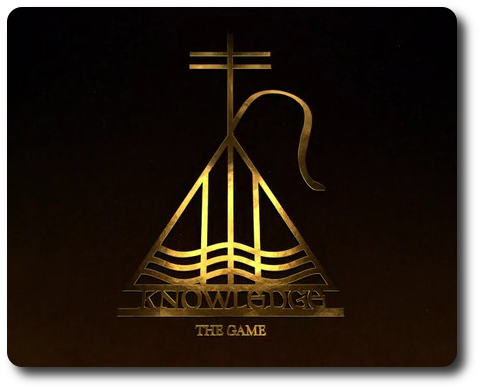
The Basics:
- For ages 10 and up
- For 2 to 5 players
- Approximately 90 minutes to complete
Geek Skills:
- Active Listening & Communication
- Counting & Math
- Logical & Critical Decision Making
- Reading
- Strategy & Tactics
- Risk vs. Reward
- Hand/Resource Management
Learning Curve:
- Child – Easy
- Adult – Easy
Theme & Narrative:
- Knowledge is the key to power
Endorsements:
- Gamer Geek mixed!
- Parent Geek approved!
- Child Geek approved!
Overview
Some believe that the power of mages comes from an otherworldly place. This is only partially true. What makes a mage a mage is not the fireballs they throw in the air or the conjuring tricks. No. Knowledge of the arcane and what it’s capable of is what makes a true wielder of magic powerful. In this game, you will seek knowledge to crush your foes before they crush you.
Knowledge, designed and self-published by Kevin Larkins, is comprised of 5 standard six-sided dice, 15 Amethyst “Mana” stones, and 405 cards. The card illustrations depict fantasy creatures, heroes, and remote locations. As this is a review of a prepublished game, I cannot comment on the game component quality.
On Rocks and Paper
There are several different card types in the game. Each has a role to play, which is summarized here.
Mana Cards and Mana Stones
Mana is best thought of as a form of currency in the game. Buying cards is referred to as “Summoning”. Mana values depict both Summoning cost and power. Players begin the game with limited Mana at their disposal.
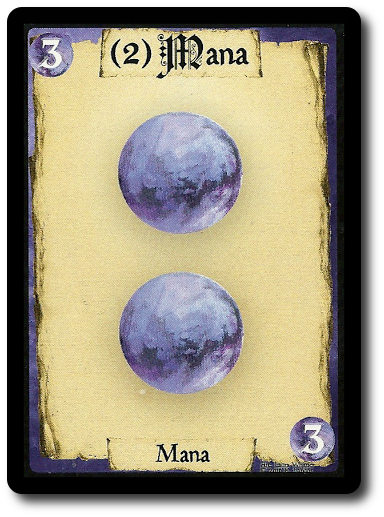
Each Mana stone is the equivalent to 1 Mana value. They are earned through winning battles, skipping summoning, and being provided by certain cards. Unlike the Mana cards, Mana stones must be spent as quickly as they are acquired, making them a useful – but fleeting – source of magical power.
Move Cards
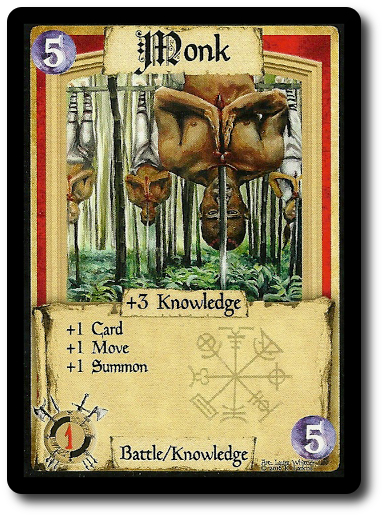
Move cards give the player special actions they can take during their turn. They can also be used to defend against other Move cards. Move cards will give the player a bonus to playing additional Move cards, a bonus to buying additional cards, and a bonus to total Mana. The 4 different types of Move cards include the “Battle” (attacking), the “Structure” (defense), the “Healer” (revive cards), and the “Rare” (provides multiple benefits).
Item Cards
Item cards are similar to Move cards in that they give the player additional actions, but they can only be used once. Once the player uses them, they must be Trashed.
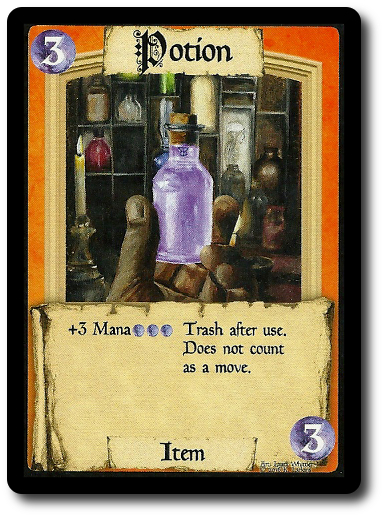
Knowledge Cards
Collecting Knowledge cards is the key to winning the game. Each Knowledge card will provide Knowledge points. In addition, acquiring certain Knowledge cards allows the player to enhance their hand and augment the normal game rules.
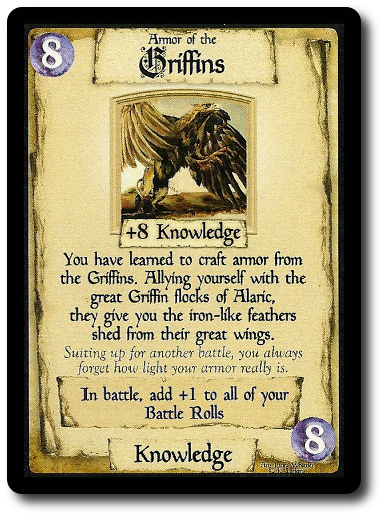
Marker and Cover Cards
These cards are used to help keep the players’ cards organized.
If Knowledge is What You Seek…
To set up the game, first select 12 different piles (I suggest a 4 x 3 grid) of Move or Item cards in the middle of the playing area. These are the cards the players will be summoning during the game.
Second, organize the Mana cards into 3 different piles by their number value. Place the Trash, and Knowledge cards (per numbered pile) next to each other, along with the Mana stones.
That’s it for game setup (minus some smaller items not documented here). Time to see who can know the most the fastest.
Knowledge is Power
Each player will have a starting hand of identical number of cards. A player’s turn is summarized here.
Step 1: Move
Play Move cards to attack, defend, and revive other cards in and out of play. Knowledge cards can also be played a this time. Only cards in the player’s hand can be played, but through the use of other cards, additional cards can be drawn. Where applicable, the outcome of card effects is determined by dice rolls.
Step 2: Summon
Player purchases cards by way of summoning them using Mana. When they come into play, they can be used to further reinforce the player’s army or defend the borders. By default, only 1 purchase can be made, but again through the use of cards, the player may be able to buy more. Since the player has already used their Move step, anything summoned cannot be used to attack or take action on another player unless it explicitly states so on the card.
Step 3: End Turn
The player now discards all their cards in their hand and any in play that do not remain. Discarded cards are not lost. They will be shuffled and brought back into play many times during the game. The player then draws 5 new cards and announces their turn is over.
Ending the Game
The game ends when all the 4 and 8 Knowledge cards have been summoned. Players now count up their total Knowledge points, including any on Move and Item cards that have not been trashed. The player who has the most Knowledge wins the game.
To learn more about Knowledge, visit the Kickstarter campaign.
Final Word
 The Child Geeks were able to grasp the basics of the game with ease, as many of them had played deck-building games in the past. According to one Child Geek, “Easy game to learn how to play, but you don’t really understand the game until you’ve played it at least 3 times.” The Child Geeks speaks to the truth. You can learn all there is to play the game in a few minutes and spend the rest of the day playing different cards in different ways. Another Child Geek said, “The cards and what they can do is pretty cool. I don’t ever feel like I have a bad hand of cards.” In truth, it’s difficult to mess up a turn, but the level of impact the player has on the game is directly proportional to how well they build their deck. The Child Geeks caught on and started to work on various combos, making each game that much more difficult to win and that much more fun to play. The Child Geeks voted to approve the game.
The Child Geeks were able to grasp the basics of the game with ease, as many of them had played deck-building games in the past. According to one Child Geek, “Easy game to learn how to play, but you don’t really understand the game until you’ve played it at least 3 times.” The Child Geeks speaks to the truth. You can learn all there is to play the game in a few minutes and spend the rest of the day playing different cards in different ways. Another Child Geek said, “The cards and what they can do is pretty cool. I don’t ever feel like I have a bad hand of cards.” In truth, it’s difficult to mess up a turn, but the level of impact the player has on the game is directly proportional to how well they build their deck. The Child Geeks caught on and started to work on various combos, making each game that much more difficult to win and that much more fun to play. The Child Geeks voted to approve the game.
 The Parent Geeks also had zero issue learning how to play the game, but were not as proficient at making card combos as quickly as their younger counter parts. When I asked why, one Parent Geek said, “I’ve played deck-builders before, but I tend to play them once and then move onto another game. I just don’t have the kind of experience the Child Geeks have.” EXCUSES! When the Parent Geeks and Child Geeks played against each other, the Parent Geek held their own due to their years of experience, while the Child Geeks were able to maintain the line thanks to their intuitive sense of what cards worked best together. This made for some excellent game observation. When just the Parent Geeks played against each other, the games became less exciting, but never lost an intense feeling of competition. When the games were over, the Parent Geeks voted to approve Knowledge.
The Parent Geeks also had zero issue learning how to play the game, but were not as proficient at making card combos as quickly as their younger counter parts. When I asked why, one Parent Geek said, “I’ve played deck-builders before, but I tend to play them once and then move onto another game. I just don’t have the kind of experience the Child Geeks have.” EXCUSES! When the Parent Geeks and Child Geeks played against each other, the Parent Geek held their own due to their years of experience, while the Child Geeks were able to maintain the line thanks to their intuitive sense of what cards worked best together. This made for some excellent game observation. When just the Parent Geeks played against each other, the games became less exciting, but never lost an intense feeling of competition. When the games were over, the Parent Geeks voted to approve Knowledge.
 The Gamer Geeks acknowledged that Knowledge was a well designed game with some good ideas, but didn’t set itself apart enough to feel like a unique game in and of itself. According to one Gamer Geek, “This game feels like it has a bit of Magic and a bit of Dominion. Both good games, but this feels like a strange copy of the two.” The Gamer Geeks liked the buying and action, as well as the combat. None of it felt out-of-place, but they did question the level of focus on the move phase versus the summon phase. As one Gamer Geek put it, “The game is putting all of its eggs into one basket here. If you don’t like confrontation in your deck-building game, then I don’t think this game would be of much use to you.” After several games, the Gamer Geeks paused to reflect on what they found and experienced. In the end, half of the Gamer Geeks rejected Knowledge, finding it to be an unoriginal game concept. The other half very much enjoyed their experienced and moved to approve the game. This left Knowledge with a mixed level of approval from the gaming elitists.
The Gamer Geeks acknowledged that Knowledge was a well designed game with some good ideas, but didn’t set itself apart enough to feel like a unique game in and of itself. According to one Gamer Geek, “This game feels like it has a bit of Magic and a bit of Dominion. Both good games, but this feels like a strange copy of the two.” The Gamer Geeks liked the buying and action, as well as the combat. None of it felt out-of-place, but they did question the level of focus on the move phase versus the summon phase. As one Gamer Geek put it, “The game is putting all of its eggs into one basket here. If you don’t like confrontation in your deck-building game, then I don’t think this game would be of much use to you.” After several games, the Gamer Geeks paused to reflect on what they found and experienced. In the end, half of the Gamer Geeks rejected Knowledge, finding it to be an unoriginal game concept. The other half very much enjoyed their experienced and moved to approve the game. This left Knowledge with a mixed level of approval from the gaming elitists.
 The only aspect of the game made me feel like I wasn’t playing “yet another deck-building game” was the combat. Everything else about the game felt familiar and a bit tired, to be honest. To be fair, the method in which cards are drawn and redrawn is pretty standard, so I do not hold it against a game to use a rule or game mechanics that work and work well. But for someone like myself, who plays lots and lots of games, seeing the same thing again and again gets old. While many aspects of the game did feel wearily familiar, the combat system did not. Player can set up their cards to attack and counter-attack a number of times, making combat a deadly business. Fun and challenging combos are very possible for both sides who engaged in attacks and defense. This makes the battles much more than comparing card values and rolling dice.
The only aspect of the game made me feel like I wasn’t playing “yet another deck-building game” was the combat. Everything else about the game felt familiar and a bit tired, to be honest. To be fair, the method in which cards are drawn and redrawn is pretty standard, so I do not hold it against a game to use a rule or game mechanics that work and work well. But for someone like myself, who plays lots and lots of games, seeing the same thing again and again gets old. While many aspects of the game did feel wearily familiar, the combat system did not. Player can set up their cards to attack and counter-attack a number of times, making combat a deadly business. Fun and challenging combos are very possible for both sides who engaged in attacks and defense. This makes the battles much more than comparing card values and rolling dice.
Overall I found the game to be just OK. The rules are solid, but nothing special. The game play is solid, but again, nothing special. The only note worthy aspect is the combat, but not enough of that goes on in the game to make the rest of it shine. Here is a game that if you played it you wouldn’t be disappointed, but nor do I think you’d be particularly interested in digging deeper into it. It plays well right out of the box, delivers on its promise, and challenges players enough to keep them engaged. Again, solid. If you are looking for a solid game, then do give Knowledge a try.
This is a paid for review of the game’s final prototype. Although our time and focus was financially compensated, our words are our own. We’d need at least 10 million dollars before we started saying what other people wanted. Such is the statuesque and legendary integrity of Father Geek which cannot be bought except by those who own their own private islands and small countries.



